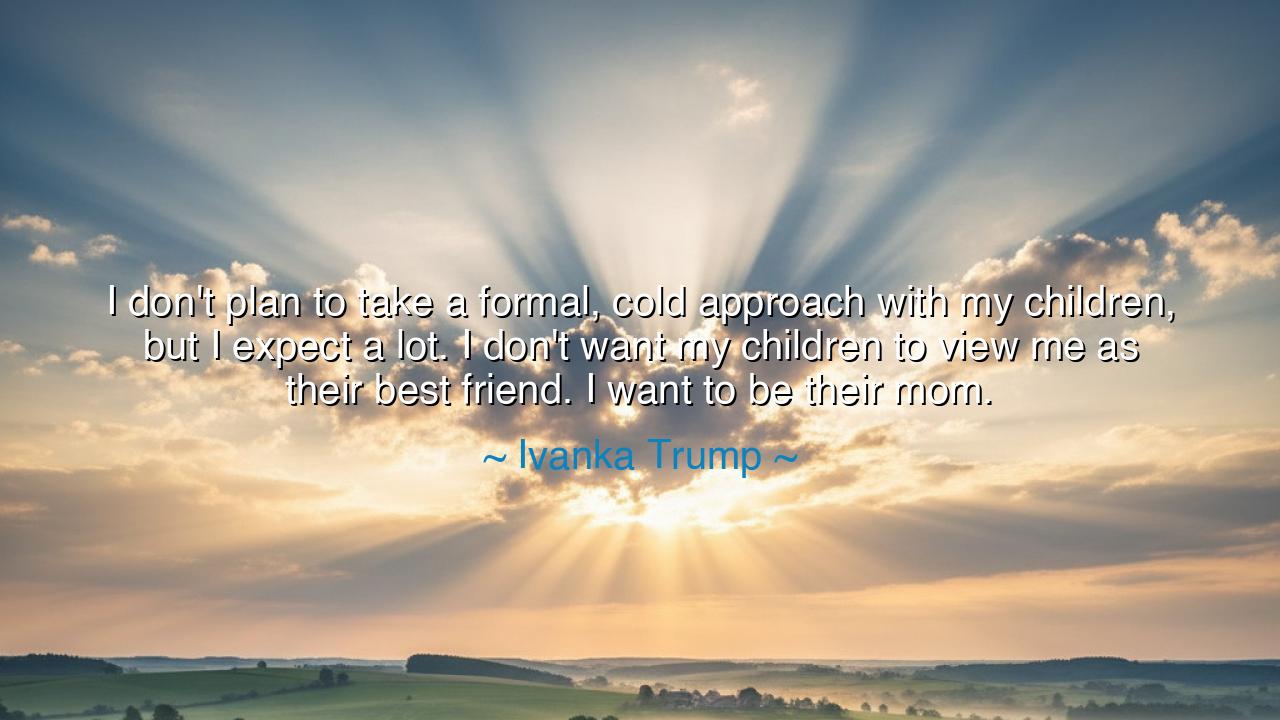
I don't plan to take a formal, cold approach with my children
I don't plan to take a formal, cold approach with my children, but I expect a lot. I don't want my children to view me as their best friend. I want to be their mom.






The words of Ivanka Trump, “I don’t plan to take a formal, cold approach with my children, but I expect a lot. I don’t want my children to view me as their best friend. I want to be their mom,” reveal a wisdom as ancient as motherhood itself — a truth that transcends luxury, fame, and era. Her statement carries the quiet authority of a woman who understands the delicate balance between love and guidance, between the tenderness of friendship and the firmness of duty. In this, she echoes a timeless principle: that to be a true parent is to love deeply, but never to forget the sacred responsibility of shaping character.
The ancients often spoke of the dual nature of parenthood — the nurturing warmth of the hearth and the sternness of the teacher’s hand. A mother who is too distant breeds coldness; a mother who is too indulgent breeds weakness. Ivanka’s words stand between these two extremes. She rejects the idea of “formality” — the chill of authority without affection — but she also refuses the temptation of being merely a companion. For to be a friend is to walk beside, but to be a parent is to walk ahead, lighting the path for those who follow. Love must be both comfort and compass, or it ceases to guide.
History itself offers many reflections of this truth. Consider Queen Olympias, the mother of Alexander the Great. She loved her son fiercely, but her love was not a soft one. She expected greatness of him, not because she was cold, but because she saw in him the fire of destiny. Her discipline did not diminish her affection — it shaped it. So too, Ivanka’s words suggest a modern echo of that ancient wisdom: that expectation is a form of love, when born not from pride but from faith in a child’s potential. To expect much is not to demand perfection, but to say, “I believe you can rise.”
In our age, where boundaries blur and authority is often feared, Ivanka’s declaration is a call back to the noble art of parenthood. To be a “mom” — in her words — is not simply to nurture, but to form. Friendship is easy, for it asks only acceptance; motherhood is sacred, for it requires both mercy and correction. The parent who wishes to be liked may raise children who are loved but lost. The parent who wishes to be respected must sometimes bear the weight of being misunderstood. Yet, when the years pass, those same children look back and see that love’s firm hand was never cruelty — it was care in its highest form.
Her approach also reflects an understanding of emotional maturity — that children need parents who are steady when emotions shift. A mother who is only a friend may hesitate to confront; a mother who is truly a mother knows when to draw the line, to protect, to challenge, to guide. It is this blend of warmth and strength that creates resilience. In the words of the Stoics, “The oak grows strong not in the shelter, but in the wind.” Likewise, the child becomes wise not in comfort alone, but in the steady guidance of a parent who dares to expect more.
There is also humility in her words. For Ivanka Trump, despite her wealth and privilege, acknowledges that parenting is not control — it is stewardship. The child is not an extension of the parent’s ego, nor a companion to ease loneliness. The child is a soul entrusted for a season, to be shaped, taught, and then released into the world. The true parent does not seek to be remembered as “fun,” but as faithful. Not as a friend who indulged, but as a guardian who prepared.
The lesson, then, is both tender and profound: do not trade guidance for approval, nor discipline for comfort. To raise children is not to give them everything they want, but to give them the strength to earn what they deserve. Be gentle, but steadfast; approachable, but principled. The friendship of a child is fleeting, but their respect endures forever. As Ivanka Trump reminds us, a mother’s greatest gift is not her companionship, but her courage to be the anchor — the firm, loving presence that says, “You may not always like me, but you will always know I am here for your good.” For that is not only motherhood — it is legacy.






AAdministratorAdministrator
Welcome, honored guests. Please leave a comment, we will respond soon